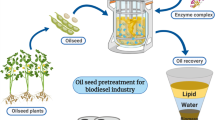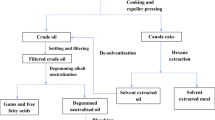Abstract
In a previous report [Zúñiga, M.E., J. Concha, C. Soto, and R. Chamy, Effect of the Rose Hip (Rosa aff. rubiginosa) Oil Extraction Cold-Pressed Process, in Proceedings of the World Conference and Exhibition on Oilseed Processing, and Utilization, edited by R.F. Wilson, AOCS Press, Champaign, 2001, pp. 210–213], the authors showed that an enzymatic pretreatment of rose-hip seeds, prior to oil extraction by cold pressing, improves the oil yield. In this work, we studied the effects of temperature and moisture during the enzymatic hydrolysis stage using two previously selected mixtures of commercial enzymes: (i) Olivex (mainly pectinase) plus Cellubrix (mainly cellulase), and (ii) Finizym (mainly β-glucanase) plus Cellubrix (mainly cellulase) (all from Novozymes A/S, Madrid, Spain). In addition, we evaluated the effect of enzymatic hydrolysis on the oil extraction pressing rate at different operational pressures. Samples hydrolyzed enzymatically by either of the two commercial enzyme mixtures at 45°C and 30–40% moisture showed oil extraction yields up to 60%, an increase of greater than 50%, as compared with control samples in which the enzyme solutions were replaced by water. Both the oil extraction rate and yield by pressing increased when enzymatic pretreatment was applied. The oil extraction yield increased slightly when the operation pressure was elevated; however, when the sample was preheated, the oil extraction yield was greatly increased, especially for enzyme-treated samples. Results confirmed the importance of temperature and moisture as enzymatic hydrolysis parameters that improve rose-hip oil extraction yields in the cold-pressing process. When pressing was carried out after preheating enzymatically treated samples, it was possible to increase the oil extraction yield to 72% compared with the control without preheating, which resulted in a 46% oil yield.
Similar content being viewed by others
References
Domínguez, H., M.J. Nuñez, and J.M. Lema, Enzymatic Pretreatment to Enhance Oil Extraction from Fruits and Oilseeds, a Review, Food Chem 49:271–286 (1994).
Zúñiga, M.E., J. Concha, C. Soto, and R. Chamy, Effect on the Rose Hip (Rosa aff. rubiginosa) Oil Extraction Cold-Pressed Process, in Proceedings of the World Conference and Exhibition on Oilseed Processing and Utilization, edited by R.F. Wilson, AOCS Press, Champaign, 2001, pp. 210–213.
Buenrostro, M., and A. López-Munguía, Enzymatic Extraction of Avocado Oil, Biotechnol. Lett. 8:505–506 (1986).
Che Man, Y.B., A.B. Suhardiyono, A.B. Asbi, M.N. Azudin, and L.S. Wei, Aqueous Enzymatic Extraction of Coconut Oil, J. Am. Oil Chem. Soc. 73:683–686 (1996).
Cintra, O., A. López-Munguía, and J. Vernon, Coconut Oil Extraction by a New Enzymatic Process, J. Food Sci. 51:695–697 (1986).
Freitas, S.P., R.C.A. Lago, F.H. Jablonka, and L. Hartman, Aqueous Enzymatic Extraction of Avocado Oil from Fresh Pulp, Rev. Fr. Corps Gras 40:365–371 (1993).
Sharma, A., S.K. Khare, and M.N. Gupta, Enzyme-Assisted Aqueous Extraction of Rice Bran Oil, J. Am. Oil Chem. Soc. 78: 949–951 (2001).
Tano-Debrah, K., and Y. Ohta, Aqueous Extraction of Coconut Oil by an Enzyme-Assisted Process, J. Sci. Food. Agric. 74:497–502 (1997).
Schwimmer, S., Influence of Water Activity on Enzyme Reactivity and Stability, Food Technol. 34:64–74 (1980).
Zúñiga, M.E., R. Chamy, and J.M. Lema, Canola and Chilean Hazelnut Products Obtained by Enzyme-Assisted Cold-Pressed Oil Extraction, in Proceedings of the World Conference and Exhibition on Oilseed Processing and Utilization, edited by R.F. Wilson, AOCS Press, Champaign, 2001, pp. 203–209.
Sosulski, K., and F.W. Sosulski, Enzyme-Aided vs. Two-Stage Processing of Canola: Technology, Product Quality, and Cost Evaluation, J. Am. Oil Chem. Soc. 70:825–829 (1993).
Spiegel, M., Estadística, McGraw-Hill Interamericana de España, Madrid, 1991, pp. 375–410.
Novo Nordisk Ferment Ltd., Technical Bulletins B756b-GB, B215d-E, and B447b-GB, Novo Nordisk, A/S, Dittingen, Switzerland, 1988.
Zúnñiga, M.E., C. Soto, A. Mora, R. Chamy, and J.M. Lema, Enzymatic Pretreatment of Guevina avellana mol Oil Extraction by Pressing, Process Biochem. 39:51–57 (2003).
Smith, D.D., Y.C. Agrawal, B.C. Sarkar, and B.P.N. Singh, Enzymatic Hydrolysis Pre-treatment for Mechanical Expelling of Soybeans, J. Am. Oil Chem. Soc. 70:885–890 (1993).
Author information
Authors and Affiliations
Corresponding author
About this article
Cite this article
Concha, J., Soto, C., Chamy, R. et al. Enzymatic pretreatment on rose-hip oil extraction: Hydrolysis and pressing conditions. J Amer Oil Chem Soc 81, 549–552 (2004). https://doi.org/10.1007/s11746-006-0939-y
Received:
Accepted:
Issue Date:
DOI: https://doi.org/10.1007/s11746-006-0939-y




